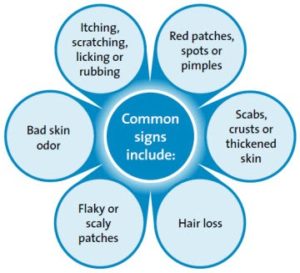While we are all looking forward to the spring weather, there are some pets that suffer badly from skin issues in the warmer months. This months blog discusses allergic skin disease and dietary management. While this information is of a general nature, please contact the clinic to discuss the individual recommendations for your pet.
What causes skin conditions?
Your veterinarian may recommend tests to identify the exact reason for your dog’s skin condition. Common causes include:
Allergies: Your dog may be allergic / intolerant to either foods or environmental factors like dust, grasses, pollen or mould.
Parasites: Fleas, lice and mites can all cause mild to severe skin irritation.
Hormonal Imbalances: Dogs with too much or too little of certain hormones are prone to skin problems.
Infections: Bacterial infections can cause skin problems.
Does my dog have a skin condition?
Your dog’s skin should be smooth and soft with no flaking, redness or signs of irritation. It should be neither too dry nor too oily or have areas of hair loss. Signs of skin disease include the following:
- Red patches, spots or pimples
- Scabs, crusts or thickened skin
- Hair loss
- Flaky or scaly patches
- Bad skin odour
- Itching, scratching, licking or rubbing

IMPORTANT: Skin discomfort can have many causes. If your dog is showing signs of skin irritation or discomfort, consult your veterinarian for diagnosis and treatment.
Choosing the Right Food
The food your dog eats plays a major role in their overall health and well-being. Balanced nutrition is an essential part of an active, healthy lifestyle. When your dog has a skin condition, it’s even more important to feed the right dog food.
Some skin conditions can be cleared up quickly, while others need lifelong management. The good news is, most dogs with skin conditions can be helped if you feed the right dog food, even if the cause of the condition is not nutritional.
Some important nutrients that can help heal and protect your dog’s skin include:
Protein: High-quality protein provides the building blocks to repair damaged skin. Feeding unique protein sources, such as venison or duck, can also help reduce reaction in dogs with a food allergy or intolerances to more common ingredients.
Essential Fatty Acids: A diet containing high levels of omega-3 and omega-6 fatty acids, will help protect your dog’s skin, prevent dryness and help control inflammation.
Antioxidants: Vitamin E and other antioxidants are vital in helping to maintain your dog’s healthy immune system and protect it from cellular oxidation caused by free radicals.
Combining these nutrients in a single dog food provides a convenient way to manage your dog’s skin condition. If feeding a premium diet formulated for healthy skin it is unnecessary to give extra supplements, such as fish oil capsules, as the diet is already rich in these vitamins.
Consult your veterinarian for the appropriate dog food recommendation for your dog’s needs.
Allergy Testing
Testing for allergies in dogs may involve a blood test to help identify the causes of the allergy. Identifying the causes will help you to avoid those triggers or manage them, with desensitisation vaccines. Most pets respond well to the desensitisation, and this reduces the need for medications.
However skin patch testing performed at a specialist dermatologist can be more conclusive as to the causes of the skin allergy. We can advise on individual patients and refer to a dermatologist when recommended.
Food Allergies
Food allergies that trigger skin issues are relatively rare in pets. The latest trend of grain-free diets actually provide no protection for allergies over normal diets and are just a marketing fad. Pets with reactions to food will more commonly exhibit gastrointestinal problems and Inflammatory Bowel Disease symptoms rather than skin issues.
The reasons a veterinarian may suspect a food allergy is:
– The reaction is persistent whilst on the food. No seasonal flare ups or settling down.
– The meat or carbohydrate source is something they have been fed long term or had exposure to in the past. Usually occurs in middle age, not young dogs.
For pets that have persistent skin issues all year round, a dietary trial is the only way to find out if it is related to the diet. A dietary trial requires strict control over what is fed to your pet so that they only eat or have access to the prescribed diet. Unfortunately reactions from food can cause long-lasting skin problems so a trial period of 8-weeks is required before a food allergy can be ruled out.






